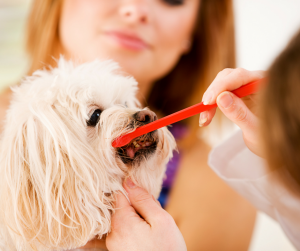Dental disease is one of the most common medical conditions we see in pets. Studies have shown that over two thirds of all dogs and cats over the age of three have some form of periodontal or dental disease.
Unfortunately, few pets display obvious signs of dental disease, so it’s up to us prevent it and monitor their dental health. Diligence will go a long way toward avoiding unnecessary discomfort for your pet and more extensive (and expensive) problems that can result from disease taking hold. For more information about periodontal disease, visit our post about preventing pet dental health problems.
Dental Care for Your Pet
There are two key components to effective dental care for your pet. 1) preventive care at home and 2) regular check ups by your veterinarian.
Preventive Dental Care at Home
The foundation of good oral health for your dog or cat is a routine of regular tooth brushing with a pet toothpaste (never with toothpaste intended for people). We recommend daily, or at least 3 to 4 times per week.
Additionally, many pets benefit from products such as dental chews and specially-formulated foods and oral rinses. There are many products out there, some of which require a prescription, so it is best to consult your veterinarian before you try any of them.
After assessing your pet’s dental health, we can help you establish a good dental health routine at home and determine if any special oral care products are needed.
Dental Care Services at Muller Veterinary Hospital
In addition to your at-home routine, it is important to have your pet’s dental health assessed regularly by a veterinarian.
Dental Cleaning. We conduct regular dental cleaning for dogs and cats. This procedure is performed under full general anesthesia, allowing us to thoroughly evaluate your pet’s teeth and perform a comprehensive cleaning. Our team members clean all surfaces of the teeth, including removing plaque and tartar from under the gumline. By performing our examination and cleaning while your pet is anesthetized, we are also able to polish the teeth after scaling, which helps delay plaque buildup.
Dental X-Rays. Your pet may need dental x-rays to further evaluate a condition that the veterinarian notices during a cleaning. X-rays allow us to identify issues that can’t otherwise be seen, like an infection at the root of a tooth or in the jaw bone.
We perform digital x-rays right here at Muller Veterinary Hospital, as well as procedures such as dental extractions. Depending upon your pet’s dental situation, we may refer you to a veterinary dental specialist.
A Note About Dental Care for Exotic Pets
For your pint sized pet many of the same tips apply. Brushing tiny mouths at home can be extra challenging, but the benefits are great. It’s best to discuss your pet’s dental health with us so we can develop a healthy routine together.
To schedule an appointment with one of our doctors, complete our Registration Form, then give us a call at (925) 934-8042 or email us.

